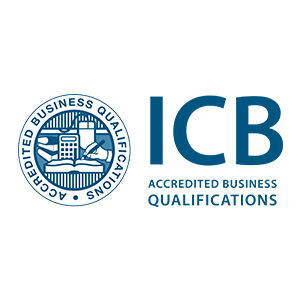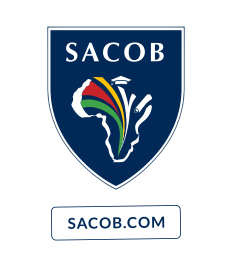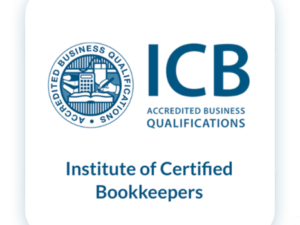
SACOB is proudly accredited to offer the The Institute of Certified Bookkeepers (ICB) qualifications.
The ICB is an examining body and a Quality Assurance Partner (QAP) of the Quality Council for Trades & Occupations (QCTO). The ICB qualifications are certificated by the Financial and Accounting Services Sector Education and Training Authority (FASSET) Skills Education and Training Authority (SETA).
The ICB has been around since 1931. Its role is to improve and maintain the quality, credibility and reputation of bookkeeping, accounting, office administration and financial management training and qualifications in Southern Africa.
ICB graduates are recognised worldwide by the International Association of Bookkeepers, the Southern African Institute of Business Accountants, the South African Institute of Tax Practitioners, the Association of Chartered Certified Accountants (ACCA) and the Chartered Institute of Management Accountants (CIMA).
There are 3 qualifications to choose from;
Financial Accounting
You can view the outcomes of this qualification here – ICB Financial Accounting Programme learning outcomes.
Office Administration
You can view the outcomes of this qualification here – ICB Administration Programme learning outcomes
Business Management
You can view the outcomes of this qualification here – ICB Business Management Programme learning outcomes
ICB assessments can be written at assessment centres around South Africa, with many assessments now taking place online.
Each ICB course is assessed by the ICB by means of an ICB Portfolio of Evidence (PoE) where you are required to complete ICB Activities (assignments) and Evaluations (tests) and then complete a final ICB summative assessment (exam) written at an ICB assessment centre which counts for 70% of you course grade, 30 % of your final mark comes from the activities and evaluations you undertake during your ICB course.
When ICB students write the final ICB assessment they will need to provide their ICB PoE and include any ICB assignments given to them as well the tests taken and include it in their PoE, which an ICB registered assessor will then check. The ICB activities and evaluations are essential, as they fully prepare students for the final ICB assessment, and also provide evidence of the work done leading up to it. The ICB Portfolio of Evidence (PoE) is a folder posted to students at the start of the course (once registered for an assessment with the ICB). Your ICB PoE is complete when your final ICB summative assessment (exam) is added to it at the end of your ICB course.
We are here to help you. Review the programme information below. If you would like more information then click on the ‘Contact Course Advisor’ button and we’ll contact you. Or if you would prefer to chat we have a Course Advisor online right now to chat with you.
Key ICB Subjects Include:
-
ICB Office Administration, Financial Accounting and Business Management Foundation Level: Subject – Bookkeeping to Trial Balance
This course forms the foundation of your accounting knowledge and can be found in every ICB Programme, no matter what stream you are studying. It assumes no knowledge of bookkeeping and teaches the student to prepare the books of account from source documents to the subsidiary journals to the general and subsidiary ledgers, trial balance, and the bank and creditors reconciliations. ... more
Bookkeeping / Accounting
 Institute of Certified Bookkeepers (ICB)
Institute of Certified Bookkeepers (ICB)
ICB Office Administration, Financial Accounting and Business Management Foundation Level: Subject – Bookkeeping to Trial Balance
-
ICB Financial Accounting Foundation Level: Subject – Business Literacy
This course forms part of the Foundation Level in every ICB Programme, no matter what stream you are studying. It is a unique course, in that both communication and mathematics learning outcomes are covered at the same time. Effective business communication and numeracy is essential for any business practitioner. This course focuses on written and spoken communication as well as numeracy business tools such as fractions, decimal numbers, percentages, ratios, proportions, equations, interest rates and graphs.... more
Administration
 Institute of Certified Bookkeepers (ICB)
Institute of Certified Bookkeepers (ICB)
ICB Financial Accounting Foundation Level: Subject – Business Literacy
-
ICB Financial Accounting Foundation Level: Subject – Computerised Bookkeeping
This course forms part of the Foundation Level of both the ICB Financial Accounting and the ICB Public Sector Accounting programmes. It introduces students to the computer, windows, email and internet as well as a study of Microsoft Office as an accounting tool. Being able to keep the books of a business on a computerised accounting software package is essential for any bookkeeper. The course also includes an in depth study of dedicated computerised accounting using industry leading software packages.... more
Bookkeeping / Accounting
 Institute of Certified Bookkeepers (ICB)
Institute of Certified Bookkeepers (ICB)
ICB Financial Accounting Foundation Level: Subject – Computerised Bookkeeping
ICB Bookkeeping to Trial Balance
Students will be able to prepare the books of account from source documents to the subsidiary journals to the general and subsidiary ledgers, trial balance, and the bank and creditors reconciliations.
ICB Business Literacy
Both communication and mathematics learning outcomes are covered at the same time. Effective business communication and numeracy is essential for any business practitioner. This course focuses on written and spoken communication as well as numeracy business tools such as fractions, decimal numbers, percentages, ratios, proportions, equations, interest rates and graphs.
ICB Computerised Bookkeeping
Students will be introduced to the computer, windows, email and internet as well as a study of Microsoft Office as an accounting tool. They will be taught how to keep the books of a business on a computerised accounting software package which is essential for any bookkeeper. The course also includes an in depth study of dedicated computerised accounting using industry leading software packages.
-
ICB Financial Accounting Intermediate Level: Subject – Cost and Management Accounting
This subject forms part of the ICB Financial Accounting, ICB Public Sector Accounting and the ICB Office Administration Programmes. It will enable a student to perform in a manufacturing environment, be able to complete basic management accounts, have a working knowledge of cost accounting, breakeven analysis, cost-volume-profit analysis, advanced costing, budgeting and standard costing, financial management and business ethics. An understanding of cost and management accounting is essential for any bookkeeper, accountant or office manager.... more
Bookkeeping / Accounting
 Institute of Certified Bookkeepers (ICB)
Institute of Certified Bookkeepers (ICB)
ICB Financial Accounting Intermediate Level: Subject – Cost and Management Accounting
-
ICB Business Management & Financial Management Intermediate Level: Subject – Financial Statements
This course forms part of the Intermediate Level in the ICB Financial Accounting, ICB Public Sector Accounting, ICB Business Management and the Entrepreneurship Programme as well at the Advanced Level in the ICB Office Administration Programme. It includes a study of year-end procedures via trading, profit and loss accounts and the interpretation of basic financial statements through a series of ratios, calculations and recordings of depreciation, the disposal of depreciable assets in the journals and general ledger, disclosing the movements of non-current assets in the notes to the financial statements. The application of accounting concepts such as that of accrual, matching prudence, cost and consistency to a set of financial records, preparation of the income statement and balance sheets (with notes) for a sole proprietorship, a partnership, a Close Corporation and a limited company as well as the preparation of the statement of cash flow and applicable notes thereto for a limited company... more
Administration
 Institute of Certified Bookkeepers (ICB)
Institute of Certified Bookkeepers (ICB)
ICB Business Management & Financial Management Intermediate Level: Subject – Financial Statements
-
ICB Financial Accounting Foundation Level: Subject – Payroll and Monthly SARS Returns
This suject forms part of the Foundation Level in the ICB Financial Accounting Programme. It builds on a basic knowledge of bookkeeping to include a study of VAT, basic conditions of employment, RSA statutory registrations, RSA payroll calculations and accounting, SARS efiling and a study of the ethics of a tax practitioner in South Africa.... more
Bookkeeping / Accounting
 Institute of Certified Bookkeepers (ICB)
Institute of Certified Bookkeepers (ICB)
ICB Financial Accounting Foundation Level: Subject – Payroll and Monthly SARS Returns
ICB Payroll and Monthly SARS Returns
It builds on a basic knowledge of bookkeeping the student will know more about VAT, basic conditions of employment, RSA statutory registrations, RSA payroll calculations and accounting, SARS efiling and a study of the ethics of a tax practitioner in South Africa.
ICB Cost and Management Accounting
It will enable a student to perform in a manufacturing environment, be able to complete basic management accounts, have a working knowledge of cost accounting, breakeven analysis, cost-volume-profit analysis, advanced costing, budgeting and standard costing, financial management and business ethics. An understanding of cost and management accounting is essential for any bookkeeper, accountant or office manager.
ICB Financial Statements
The outcomes of this ICB course is that a student will have a good understanding of year-end procedures via the trading-and profit and loss accounts; the interpretation of basic financial statements through a series of ratios; calculation and recording of depreciation; the disposal of depreciable assets in the journals and general ledger; disclosing the movements of non-current assets in the notes to the financial statements; the application of accounting concepts such as of accrual, matching prudence, cost and consistency to a set of financial records; preparing of the income statement and balance sheet (with notes) for a sole proprietorship, a partnership, a Close Corporation and a limited company; as well as the preparation of the statement of cash flow and applicable notes thereto for a limited company.
-
ICB Financial Accounting Upper Intermediate Level: Subject – Business Law and Accounting Control
This course forms part of both the ICB Financial Accounting and ICB Public Sector Accounting programmes. It completes the skills necessary for an Accounting Technician and includes a study of economics, personal finance, business law, accounting control and liquidation and executors accounts.
Bookkeeping / Accounting
 Institute of Certified Bookkeepers (ICB)
Institute of Certified Bookkeepers (ICB)
ICB Financial Accounting Upper Intermediate Level: Subject – Business Law and Accounting Control
-
ICB Financial Accounting Advanced Level: Subject – Corporate Strategy
This course forms part of the Advanced Level of both the ICB Financial Accounting and the ICB Public Sector Accounting Programmes. It aims to redefine corporate strategy to rely less on objectives and competition but rather seeing an organisations big picture that is customer focused, sustainable and successful in the long-term. This course is an in-depth study of strategic management. It shows the impact of corporate strategy on a company's ability to accelerate its sales, gain market leadership, and power up its revenue growth.... more
Bookkeeping / Accounting
 Institute of Certified Bookkeepers (ICB)
Institute of Certified Bookkeepers (ICB)
ICB Financial Accounting Advanced Level: Subject – Corporate Strategy
-
ICB Income Tax Returns
This course forms part of the Upper Intermediate Level in the ICB Financial Accounting Programme. As a tax practitioner you would require a working knowledge of all the components of Tax and should register as a member with the South African Institute of Tax Practitioners (SAIT) and will then be permitted to complete monthly and annual SARS returns on behalf of prospective clients. Only on completion of the full ICB Accounting Programme and or Technical Financial Accountant programme can one become a recognised Tax Practitioner with SAIT.... more
Bookkeeping / Accounting
 Institute of Certified Bookkeepers (ICB)
Institute of Certified Bookkeepers (ICB)
ICB Income Tax Returns
ICB Business Law and Accounting Control
The student will have a basic understanding of economics, personal finance, business law, accounting control and liquidation and executors’ accounts.
ICB Income Tax Returns
It is a comprehensive study of Income Tax, Capital Gains, Value-Added Tax, Turnover Tax, Estate Duty and Donations Tax. As a tax practitioner you require a working knowledge of all the components of Tax and will register as a member of the South African Institute of Tax Practitioners (SAIT) and be permitted to complete monthly and annual SARS returns on behalf of prospective clients.
ICB Corporate Strategy
It aims at redefining corporate strategy to rely less on objectives and competition but rather seeing an organisations big picture that is customer focused, sustainable and successful in the long – term. This course is an in-depth study of strategic management. It shows the impact of corporate strategy on a company’s ability to accelerate its sales, gain market leadership, and power up its revenue growth.
-
ICB Business Management Advanced Level: Subject – Financial Reporting and Regulatory Frameworks
The purpose of this subject is to set out the principles and conceptual issues of IFRS, including their use in group statements. IFRS signifies a new era of financial reporting that will eventually touch thousands of companies across the globe. The broader a company's international activities, the greater the effect of IFRS.... more
Bookkeeping / Accounting
 Institute of Certified Bookkeepers (ICB)
Institute of Certified Bookkeepers (ICB)
ICB Business Management Advanced Level: Subject – Financial Reporting and Regulatory Frameworks
-
ICB Financial Accounting Advanced Level: Subject – Management Accounting Control Systems
This subject forms part of the Advanced Level in the both the ICB Financial Accounting or ICB Public Sector Accounting Programmes. The purpose of this course is to develop in students a knowledge and understanding of the application of management accounting control and decision making techniques which will enable them to communicate effectively as accountants and managers. The evolution in the field of cost and management accounting has created a need for contemporary subjects that help learners make the connection between basic accounting methods and serving the overall needs of the company.... more
Bookkeeping / Accounting
 Institute of Certified Bookkeepers (ICB)
Institute of Certified Bookkeepers (ICB)
ICB Financial Accounting Advanced Level: Subject – Management Accounting Control Systems
ICB Financial Reporting and Regulatory Frameworks
The purpose of this ICB course is to set out the principles and conceptual issues of IFRS, including their use in group statements. IFRS signifies a new era of financial reporting that will eventually touch thousands of companies across the globe. The broader a company’s international activities, the greater the effect of IFRS.
ICB Management Accounting Control Systems
The purpose of this ICB course is to develop in students a knowledge and understanding of the application of management accounting control and decision making techniques which will enable them to communicate effectively as accountants and managers. The evolution in the field of cost and management accounting has created a need for contemporary courses that help learners make the connection between basic accounting methods and serving the overall needs of the company.
